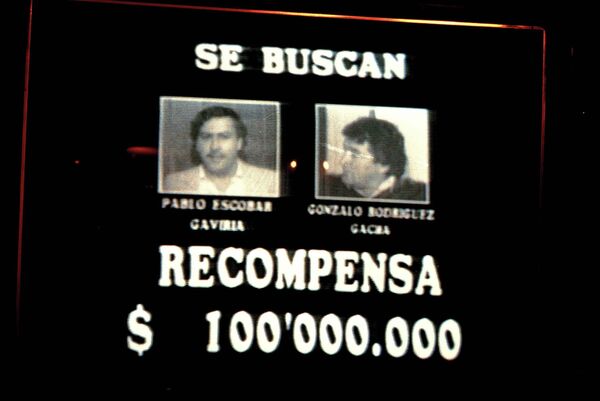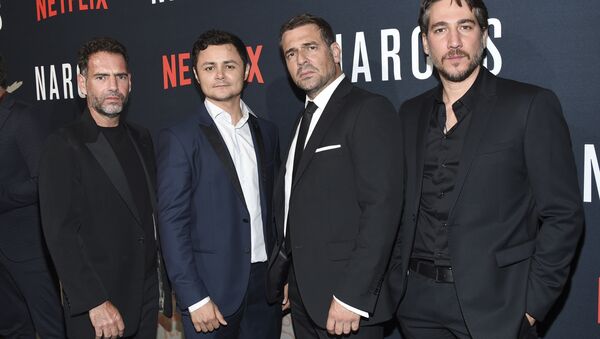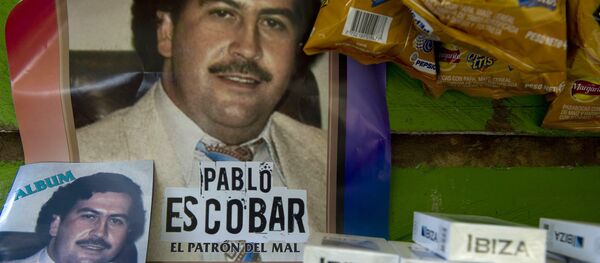Karen Granero, a Colombian journalist, said she believed Narcos was cashing in on Colombia's agony.
A new empire rises. Narcos season 3 is now streaming. #Narcos pic.twitter.com/p49rJtoCTF
— Narcos (@NarcosNetflix) 1 September 2017
"It is estimated that in 30 years, drug trafficking left at least 30,000 dead in Colombia, and millions were forcefully displaced," Ms. Granero told Sputnik.
"It has been the main financial resource of left- and right-wing extremist groups. It is a national tragedy that the country has not yet recovered from," said Ms. Granero, who now lives in Argentina.
"A TV series that glamorizes drug traffickers and reduces it to just a lifestyle, does little to contribute to the comprehensive understanding of its real impact and is a blow to the victims and their families," Ms. Granero told Sputnik.
The Show
The first two seasons of Narcos focused on the Medellin Cartel and in particular Pablo Escobar, who was even given a chilling on-screen catchphrase, "Plata o Plomo (Silver or Lead)" which he used when cajoling and threatening politicians and police officers.

The second season ended with his death, in 1993, and the third follows the rise of the Cali Cartel, which gradually took over the cocaine trafficking trade from their rivals in Medellin.
The cartel, based in the city of Cali, was led by Gilberto Rodríguez Orejuela and his brother Miguel, and their associate Jose Santacruz Londono.
Men, get over it. #Netflix #LatinoAmerica #Colombia #Narcos pic.twitter.com/XHA4Ujy3MZ
— The True América CO (@TrueAmerica_1) 23 August 2017
Escobar 'Hero Worship a Strange Thing'
William C. Rempel, an American author and consultant on the third season of Narcos, said he understood some of the criticism.
"There is something to that. Pablo Escobar's hero worship is a strange thing to me because he was such a bad human being. He ran such a vile operation, with violence and coercion and terror. He was a terrorist. So I understand how people have some bad feelings about that and the glamorization of Pablo," Mr. Rempel told Sputnik.
Mr. Rempel was brought in to advise on the accuracy of the plot after he wrote At The Devil's Table, which told the real-life story of Jorge Salcedo, a Cali Cartel insider who helped bring the network down.
Gracias to all in terrific cast of UniMas novela EN LA BOCA DEL LOBO based on my book. #BocaDelLobo #bocadellobotv pic.twitter.com/KjlzByObaj
— William C. Rempel (@WilliamRempel) January 7, 2015
Mr. Rempel sold the TV rights of his book to a Colombian TV channel, who made their own Spanish language telenovela, En La Boca Del Lobo (In The Wolf's Mouth), which has been highly successful in Colombia.
"I do sympathize with the Colombians because they're fed up with the whole narco storyline, because they're victims of it. It's like turning the Houston floods into a story. The people living it are not amused by the storytelling when they are still recovering from the victimization. But there are things to learn from it which I think are important to convey," Mr. Rempel told Sputnik.
How It All Began
Mr. Rempel said he was working as an investigative reporter at the Los Angeles Times in 1998 when he got a phone call from one of his sources.
The Cali Cartel owned the global cocaine market. #Narcos pic.twitter.com/R6JxJIWN0F
— Narcos (@NarcosNetflix) 29 August 2017
"He said 'how would like to meet someone in witness protection who was in charge of the Cali cartel's security?' So, of course, I booked a flight to Miami and met Jorge in a federal courthouse," he told Sputnik.
He said Salcedo would ring him many times over the next few years, and he eventually had enough material to write a book.
But before he did that he had to talk to Chris Feistl, a Drug Enforcement Administration (DEA) agent, to verify Salcedo's version of events. Mr. Feistl confirmed what Salcedo said and he also became a consultant on Narcos.
Who is Gilberto Rodriguez Orejuela? #NarcosInc will tell you all you need to know… https://t.co/oCqzHFHyLK pic.twitter.com/wAWqu0TorA
— MaverickHouse (@Maverick_House) 13 August 2017
Salcedo entered a federal witness protection scheme and now lives, under another name, somewhere in the United States.
"Jorge still considers himself and his family at risk. So he still lives in secrecy. He has got a name that he was given at the time. I don't know that name and I still don't know to this day where he lives. He still maintains a level of security which is quite different from the rest of us," Mr. Rempel told Sputnik.
The Orejuela brothers were eventually extradited to the United States in 2005.
Gilberto is serving a 30-year sentence at Butner federal correctional institution in North Carolina, while Miguel is marking time at a prison in neighboring South Carolina.
Londono, also known as Don Chepe, was gunned down by Colombian police in 1996.
After the fall of the Cali cartel the nexus of the drugs world moved from Colombia to Mexico.
The Mexican cartels had the advantage of being much closer to the US border, and did not have to struggle so hard to move cocaine and other drugs by sea and air, like the Colombians.
Violence and crime fell has fallen markedly in Colombia and it is now a relative oasis of calm, compared to neighboring Venezuela.



